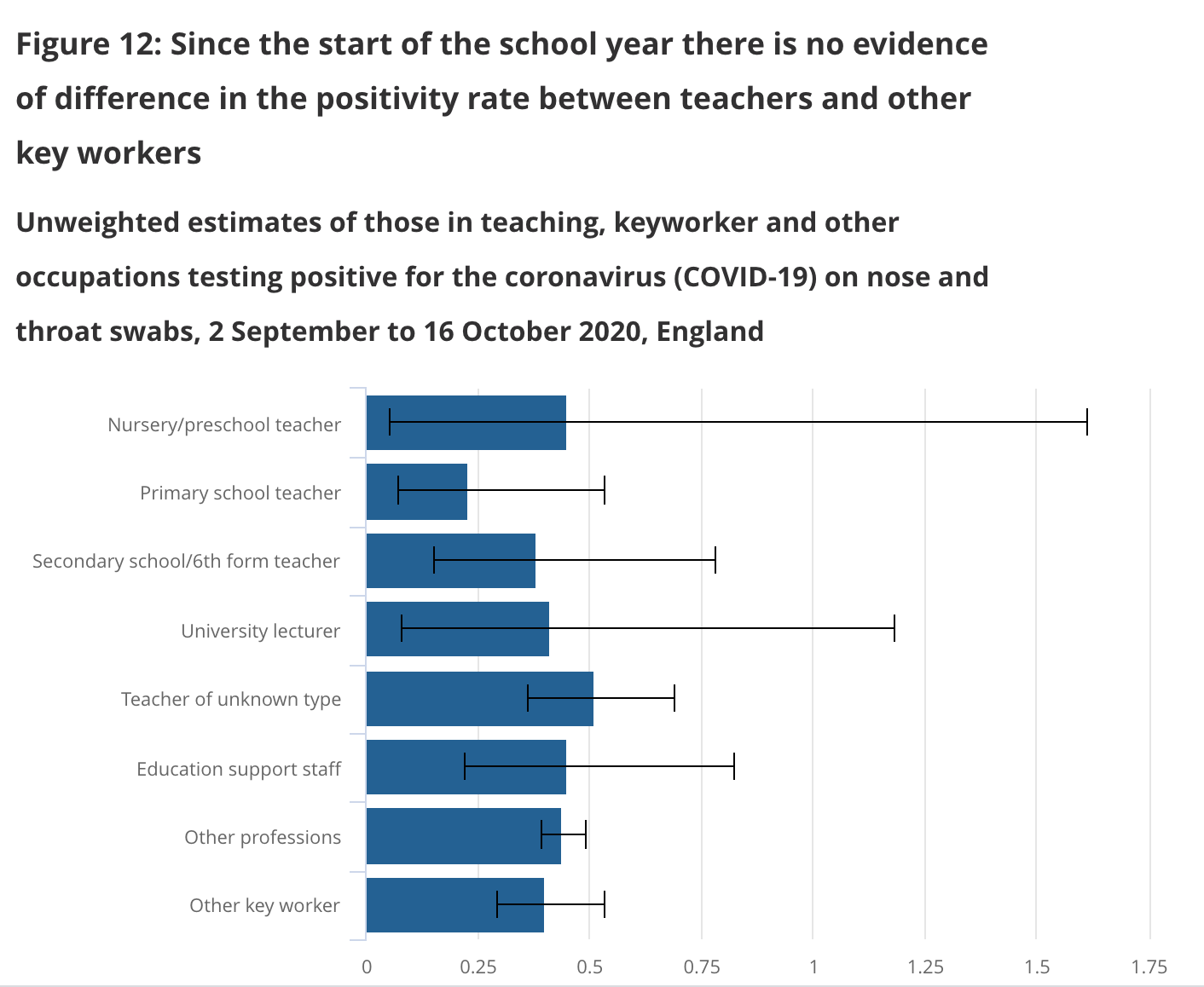- Home
- Urgent warning over ‘misleading’ teacher Covid data
Urgent warning over ‘misleading’ teacher Covid data

Figures showing that teachers were no more likely to catch Covid-19 than other key workers are “misleading”, according to an expert who has filed an official complaint to the UK statistics watchdog.
NEU teaching union joint general secretary Kevin Courtney has called for an urgent investigation into the claim, made by University of Cambridge academic Sarah Rasmussen.
Chris Whitty: Data shows teaching is not a high-risk profession
Coronavirus: DfE restores line in official document saying schools are not high-risk settings
Boris Johnson: Schools to stay open during lockdown
In her complaint, seen by Tes, Dr Rasmussen has said that data presented by the Office for National Statistics in an analysis, published earlier this month, does not support its conclusion that “there is no evidence of difference in the positivity rate between teachers and other key workers”.
Dr Rasmussen says that, in fact, one of the teacher categories in the report - “teacher of an unknown type” - has a Covid positivity rate of 0.51 per cent - 28 per cent higher than the key worker category and 16 per cent higher than other professions.

She has said this category of teachers was the only one among those lists for education settings where the margin of error was small enough to be “statistically meaningful”.
Her complaint adds: “The analysis nevertheless characterised these results by saying, ‘Data from 2 September (the start of the school year) to 16 October 2020 show no evidence of differences in the positivity rate between primary and secondary school teachers, other key workers and other professions.”
Coronavirus: Data on teacher infection ‘intentionally misleading’
“The caption furthermore stated: ‘Since the start of the school year there is no evidence of difference in the positivity rate between teachers and other key workers.’
“This is unacceptably - and seemingly intentionally - misleading. The only sense in which their characterisation and caption are correct is if one interprets the entire study as being too underpowered to provide evidence of any sort, but, in that case, why did they even publish this study?
“The authors of this analysis almost certainly knew that this characterisation would be held up as evidence that teachers were not at any additional risk.
“But if one looks at the only component of the data with enough power to be conceivably capable of generating evidence, the precise opposite of this message is true: a 28 per cent higher infection rate for teachers is a substantial effect size.”
Dr Rasmussen has also questioned why the analysis is dated from 2 September to 16 October when other data published by the ONS in this survey runs through to 31 October.
Her complaint says that excluding data from 17 October to 31 October, and including data from 2 September to 11 September - the start of the new academic year - has “artificially lowered results” for teachers relative to those in other occupations.
Her complaint adds: “No explanation is given for why data from 17-31 October were excluded, when these dates were so important to school transmission.”
Dr Rasmussen has called on the UK Statistics Authority to respond urgently to the complaint.
Commenting on Twitter, Mr Courtney said: “The outcome of this complaint to the UK Statistics Authority is very important to teachers and support staff...The NEU will write to UK Stats asking for urgent decision on this complaint.”
Dr Rasmussen has also alleged that Professor Chris Whitty, the chief medical officer for England, breached rules by referring to data before it was officially published.
Appearing before the Commons Science and Technology Select Committee, he said: “All the data, including ONS data, do not imply that teachers are a high-risk occupation, unlike, for example, social care workers and medical staff like myself.”
These comments were then promoted by the Department for Education on social media.
“All the data do not imply that teachers are a high risk occupation.” - @CMO_England, Chris Whitty. pic.twitter.com/UT6nEqCISu
- Department for Education (@educationgovuk) November 3, 2020
Dr Rasmussen’s complaints says: “It later became apparent that part nine of the 6 November ONS survey pilot data was the primary, if not sole, data to which Whitty had been referring, since neither Whitty nor the DfE made later reference to other teacher-related data.”
She adds that she believes this breached principles on the publication of official statistics, which say that: “The circulation of statistics in their final form ahead of their publication should be restricted to eligible recipients” and that “no indication of the statistics should be made public”.
A government spokesperson said: “It is completely incorrect to suggest the Chief Medical Officer referenced unpublished or misleading information. He made a statement that was supported by data already published at the time of the committee.
“We are committed to making sure teachers and school staff are as safe as possible and our guidance sets out a range of measures to reduce the risk of transmission, including through the wearing of face coverings in communal spaces outside of classrooms in secondary schools while the national measures are in force.”
The ONS and the Department for Education have been approached for comment.
Dr Rasmussen is a EPSRC fellow in the Department of Pure Mathematics and Mathematical Statistics at the University of Cambridge who is on a sabbatical fellowship at the Institute for Advanced Study at Princeton.
Keep reading for just £1 per month
You've reached your limit of free articles this month. Subscribe for £1 per month for three months and get:
- Unlimited access to all Tes magazine content
- Exclusive subscriber-only stories
- Award-winning email newsletters



